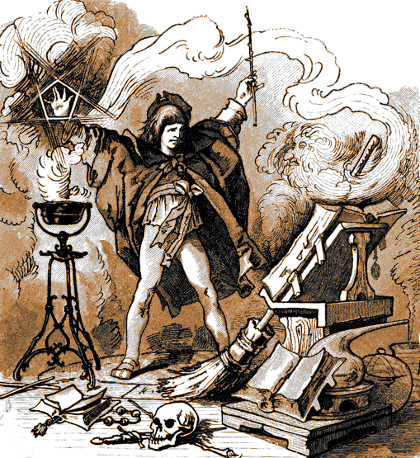
What is magic? A better question might be, “what is magic not?” Magic is not a power granted by the spirits, although theurgy appeals to spiritual forces through devotion and prayer. Magic is not governed by the whims of supernatural beings, although entities may be conjured from the aether. Magic is not a force such as magnetism or momentum, although magic may be used to bind and direct those forces.
In short, magic is the manipulation of energy to produce a desired effect.
The student of magic must first understand that nothing supernatural exists and that all phenomena are natural. Nature abounds with the living energies of the universe—what has been defined by science as heat, light, magnetism, electricity, vibration, metabolism, momentum, gravity, and aethergy. So too do all things abound with the energy of magic. The former is merely an aspect of the latter, and the latter a manifestation of the former. Any divisions that is perceived to exist between the realms of science and magic are merely illusions. Both are true and proper philosophies, inseparable and intertwined.
Magic is a quest for understanding the art of controlling and harnessing the forces of nature. Magic may be a healing hand or a deadly curse, a seductive love potion or an empowerment to bring floods and famine. Magic is neither black nor white, neither good nor evil. Most important of all, magic is not a thing. Magic is a process. It is a philosophy, a science, a way of seeing and controlling the natural world. And magic exists within each and every one of us.
The Principals of Magic
Magic is the manipulation of energy to produce a desired effect. The fundamental energy of magic is aetheric energy, or aethergy, and this aethergy can take on a multitude of resonances that can be bound into harmonic chords. Mages, elementors, sorcerers, shamans, and all who practice the aetheric arts, perform their empowerments by conducting, composing, and binding these aetheric resonances into those patterns necessary to produce a desired effect.
All magic is music, or so the ancient saying goes. The vocabulary of magic is rife with musical terminology: resonance, dissonance, harmonies, chords, compositions, scale, pitch, tone, and many more. But the most advanced fields of thaumatology have many stranger terms as well: waveform inversions, coherency functions, probability states, aetheric substrata, higher dimensional manifolds, and metaplasmic condensates. But regardless of the artistic or technical nature of magery, magic itself is not supernatural. In fact, many mages today revile the term “magic,” preferring instead to refer to magic as aetheric science, over-science, or thaumaturgy.
Schools of Magic
Traditionally, magic has been divided into five distinct schools or branches: magery, shamanism, theurgy, spiritism, and karcistry. Despite these divisions, all schools of magic inherit from the same basic set of laws and universal principles.
Read More…
Science of Magic
Like an exquisitely orchestrated symphony, empowerments are composed by weaving chords of aetheric resonance into a single harmonious pattern, producing a desired effect. Knowledge of how these chords interact with each other, and their specific resonances, harmonies, and countless nuances, is of paramount importance to every aetheric practitioner.
Read More…
Powers of Magic
By composing chords of aetheric resonance, mages and other practitioners can generate an almost limitless number of empowerments.
Read More…
Wonders of Alchemy
Alchemy is concerned with the purification, transmutation, and distillation of metals, minerals, and elements. It is a process by which the magical essence inherent in all things is tapped to release energy or to mix and transmute the base elements of substances, recombining them into new substances. Alchemy has become the cornerstone of the modern world, giving rise to such wondrous substances as whitepowder, ichor fuel, lifting gases, extraordinary alloys, and miraculous medicines.
Read More…
